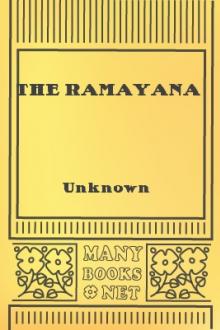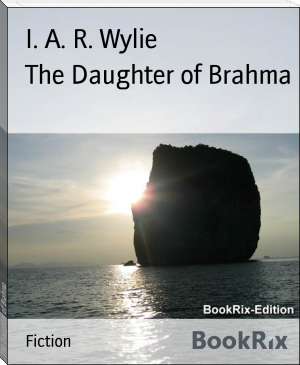The Ramayana - Valmiki (best ereader for epub txt) 📗

- Author: Valmiki
- Performer: -
Book online «The Ramayana - Valmiki (best ereader for epub txt) 📗». Author Valmiki
(Æneidos, lib. X.)” Gorresio.
“Analogous to this passage of the Rámáyana, where Indra sends to Ráma his own chariot, his own charioteer, and his own arms, is the passage in the Æneid where Venus descending from heaven brings celestial arms to her son Æneas when he is about to enter the battle:
(Æneidos, lib. VIII)” Gorresio.
[pg 554]“The Muni or saint Agastya, author of several Vedic hymns, was celebrated in Indo-Sanskrit tradition for having directed the first brahmanical settlements in the southern regions of India; and the Mahábhárata gives him the credit of having subjected those countries, expelled the Rákshases. and given security to the solitary ascetics, who were settled there. Hence Agastya was regarded in ancient legend as the conqueror and ruler of the southern country. This tradition refers to the earliest migrations made by the Sanskrit Indians towards the south of India. To Agastya are attributed many marvellous mythic deeds which adumbrate and veil ancient events; some of which are alluded to here and there in the Rámáyana.” Gorresio.
The following is the literal translation of the Canto, text and commentary, from the Calcutta edition:
Having found Ráma weary with fighting and buried in deep thought, and Rávaṇ standing before him ready to engage in battle, the holy Agastya, who had come to see the battle, approached Ráma and spoke to him thus: “O mighty Ráma, listen to the old mystery by which thou wilt conquer all thy foes in the battle. Having daily repeated the Ádityahridaya (the delighter of the mind of the Sun) the holy prayer which destroys all enemies (of him who repeats it) gives victory, removes all sins, sorrows and distress, increases life, and which is the blessing of all blessings, worship the rising and splendid sun who is respected by both the Gods and demons, who gives light to all bodies and who is the rich lord of all the worlds, (To the question why this prayer claims so great reverence; the sage answers) Since yonder1073 sun is full of glory and all gods reside in him (he being their material cause) and bestows being and the active principle on all creatures by his rays; and since he protects all deities, demons and men with his rays.
He is Brahmá,1074 Vishṇu,1075 Śiva,1076 Skanda,1077 Prajápati,1078 Mahendra,1079 Dhanada,1080 Kála,1081 Yáma,1082 Soma,1083 Apàm Pati i.e. The lord of waters, Pitris,1084 Vasus,1085 [pg 555] Sádhyas,1086 Aśvins,1087 Maruts,1088 Manu,1089 Váyu,1090 Vahni,1091 Prajá,1092 Práṇa,1093 Ritukartá,1094 Prabhákara,1095 (Thou,1096 art) Aditya,1097 Savitá,1098 Súrya,1099 Khaga,1100 Púshan,1101 Gabhastimán,1102 Śuvarṇasadriśa,1103 Bhánu,1104 Hiraṇyaretas,1105 Divákara,1106 Haridaśva,1107 Sahasrárchish,1108 Saptasapti,1109 Marichimán,1110 Timironmathana,1111 Sambhu,1112 Twashtá,1113 Mártanda,1114 Anśumán,1115 Hiranyagarbha,1116 Siśira,1117 Tapana,1118 Ahaskara,1119 Ravi,1120 Agnigarbha,1121 Aditiputra,1122 Sankha,1123 Siśiranáśana,1124 Vyomanátha,1125 Tamobhedí,1126 Rigyajussámapáraga,1127 Ghanavríshti,1128 [pg 556] Apám-Mitra,1129 Vindhyavíthíplavangama,1130 Átapí,1131 Mandalí,1132 Mrityu (death), Pingala,1133 Sarvatápana,1134 Kavi,1135 Viśva,1136 Mahátejas,1137 Rakta,1138 Sarvabhavodbhava.1139 The Lord of stars, planets, and other luminous bodies, Viśvabhávana,1140 Tejasvinám-Tejasvi,1141 Dwádaśátman:1142 I salute thee. I salute thee who art the eastern mountain. I salute thee who art the western mountain. I salute thee who art the Lord of all the luminous bodies. I salute thee who art the Lord of days.
I respectfully salute thee who art Jaya,1143 Jayabhadra,1144 Haryaśa,1145 O Thou who hast a thousand rays, I repeatedly salute thee. I repeatedly and respectfully salute thee who art Áditya, I repeatedly salute thee who art Ugra,1146 Víra,1147 and Sáranga.1148 I salute thee who openest the lotuses (or the lotus of the heart). I salute thee who art furious. I salute thee who art the Lord of Brahmá, Śiva and Vishṇu. I salute thee who art the sun, Ádityavarchas,1149 splendid, Sarvabhaksha,1150and Raudravapush.1151
I salute thee who destroyest darkness, cold and enemies: whose form is boundless, who art the destroyer of the ungrateful; who art Deva;1152 who art the Lord of the luminous bodies, and who appearest like the heated gold. I salute thee who art Hari,1153 Viśvakarman,1154 the destroyer of darkness, and who art splendid and Lokasákshin.1155 Yonder sun destroys the whole of the material world and also creates it. Yonder sun dries (all earthly things), destroys them and causes rain with his rays. He wakes when our senses are asleep; and resides within all beings. Yonder sun is Agnihotra1156 and also the fruit obtained by the [pg 557] performer of Agnihotra. He is identified with the gods, sacrifices, and the fruit of the sacrifices. He is the Lord of all the duties known to the world, if any man, O Rághava, in calamities, miseries, forests and dangers, prays to yonder sun, he is never overwhelmed by distress.
Worship, with close attention Him the God of gods and the Lord of the world; and recite these verses thrice, whereby thou wilt be victorious in the battle. O brave one, thou wilt kill Rávaṇa this very instant.”
Thereupon Agastya having said this went away as he came. The glorious Ráma having heard this became free from sorrow. Rághava whose senses were under control, being pleased, committed the hymn to memory, recited it facing the sun, and obtained great delight. The brave Ráma having sipped water thrice and become pure took his bow, and seeing Rávaṇa, was delighted, and meditated on the sun.
[pg 558]“In the funeral ceremonies of India the fire was placed on three sides of the pyre; the Dakshiṇa on the south, the Gárhapatya on the west, and the Áhavaníya on the east. The funeral rites are not described in detail here, and it is therefore difficult to elucidate and explain them. The poem assigns the funeral ceremonies of Aryan Brahmans to the Rákshases, a race different from them in origin and religion, in the same way as Homer sometimes introduces into Troy the rites of the Grecian cult.” Gorresio.
Mr. Muir translates the description of the funeral from the Calcutta edition, as follows:





Comments (0)